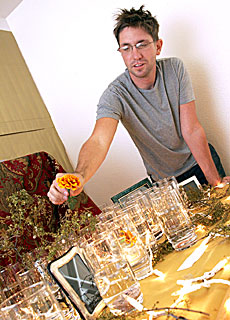 |
|
EVAN CARAVELLI/ARIZONA DAILY WILDCAT
|
Creative writing graduate student Jason Zuzga arranges a memorial display honoring those who lost their lives while crossing the U.S.-Mexico border. The display, "SpeakWater: Regando La Frontera," is an installation created by students from Zuzga's Audio/Visual Poetry class and officially opens to the public at the Poetry Center tomorrow evening.
|
|
|
By Kylee Dawson
Arizona Daily Wildcat
Wednesday, November 10, 2004
Print this
'SpeakWater' speaks for those who cannot
Emily Dickinson wrote, "Water, is taught by thirst." In the desert, everyone can relate to those words.
To memorialize those who've lost their lives while crossing the U.S.-Mexico border, members of a Poetry Center class have created an installation that fuses poetry, art and spirituality.
"SpeakWater: Regando La Frontera" is the first installation from a class or workshop to be displayed at the Poetry Center, said Gail Browne, director of the Poetry Center.
The class, "Poetry: Audio/Visual," consisted of undergraduate and graduate students, and other members of the Tucson community including UA alumna Kimi Eisele, a local writer and dancer. The class met every Monday from Sept. 13 to Oct. 18 from 6 to 8 p.m.
All the assignments from the class led up to the installation, which students conceptualized and created so visitors and readers could experience "spatially off the page," instructor Jason Zuzga said.
"I'm interested in expanding the idea of what poetry can be," Zuzga said. "(By) having students engage with words as material objects, both sonically and physically, we created poems with multiple voices to be spoken simultaneously, and we created animated flash poems on the Internet."
Rodney Phillips, a new local poet and student from Zuzga's class, said the SpeakWater installation was inspired by Prop. 200 and the fact that many people are dying in the desert while trying to get jobs to feed their families.
"This is a conceptual art piece about tolerance and words and accepting peoples' differences," Phillips said. "We tried to make it as inclusive as possible."
Students selected poems that deal with the desert and water and border issues, including "Lost Prayers," a new unpublished poem by professor Ofelia Zepeda, who teaches linguistics and Tohono O'odham at the UA, Langston Hughes's "The Negro Speaks of Rivers," Pablo Neruda's "Agua Sexual" (in Spanish and English), Demetria Martinez's "Cold Shop in Tucson," and other poems.
"I was really interested in the idea of water and its scarcity in the desert and how water can be a spiritual metaphor for unity and literal representation of salvation," Eisele said. "We all need it to survive. I tried to find poets' works that spoke to this urgency and need and gratitude for water."
The poems, all written on pieces of duct tape, create pathways starting at the Poetry Center's exterior sidewalk and lead to a memorial altar.
The altar is lined with empty picture fames, anthologies of poetry, Christmas lights and other media.
Glasses of water that contain rocks with words from the poems written on them symbolize the people who died from a lack of water.
"This is an offering of water to their spirits," Zuzga said.
The purpose is to get people to connect with and think about the words dissolving in liquid and focus the readers' attention on he poems, he said.
The pathways of poems wind through the Poetry Center library and eventually lead to a trough of water, which contains more rocks with words and a trough of sand, which contain pieces of paper with poetry.
The troughs, created by cutting a water barrel in half, symbolize the water barrels that have been left for the people who cross the desert.
"There are obviously political dimensions to this and we started doing it when people were voting on Prop. 200. Then we had that unfortunate outcome," Phillips said.
As a recipient of a 2001-2002 Residential Fellowship in Poetry from the Fine Arts Work Center in Provincetown, Mass., Zuzga completed his MFA in Poetry at UA in May and is currently a graduate assistant in the creative writing the department.
The SpeakWater installation will be officially open to the public tomorrow from 6 p.m. to 7 p.m. Refreshments will be served and students will be available to answer questions.
The installation will run until Wednesday, Dec. 15.
On Thursday, from 6:00 p.m. to 7:00 p.m., the installation will officially open to the public. Refreshments will be served, and students from the class will be on hand to answer questions.
The Poetry Center is located at 1600 E. First St. off Cherry Avenue, and is open Monday to Thursday 9 a.m. to 8 p.m., Friday 9 a.m. to 5 p.m., and Saturday 1 p.m. to 4 p.m. Parking is free for Poetry Center guests.
